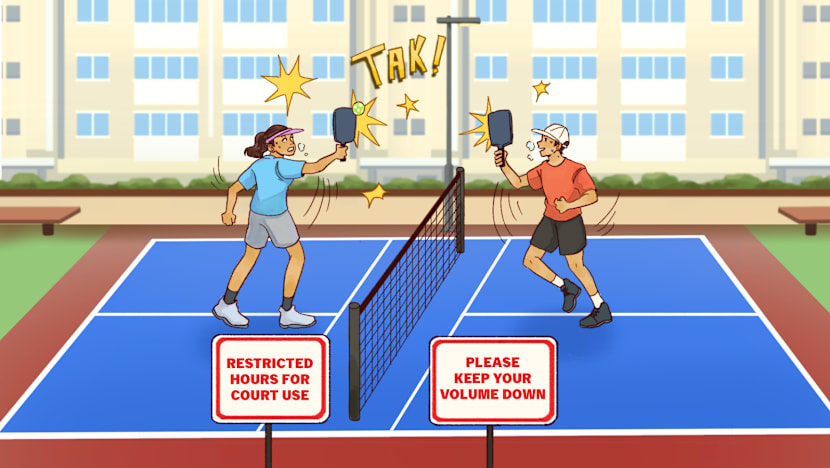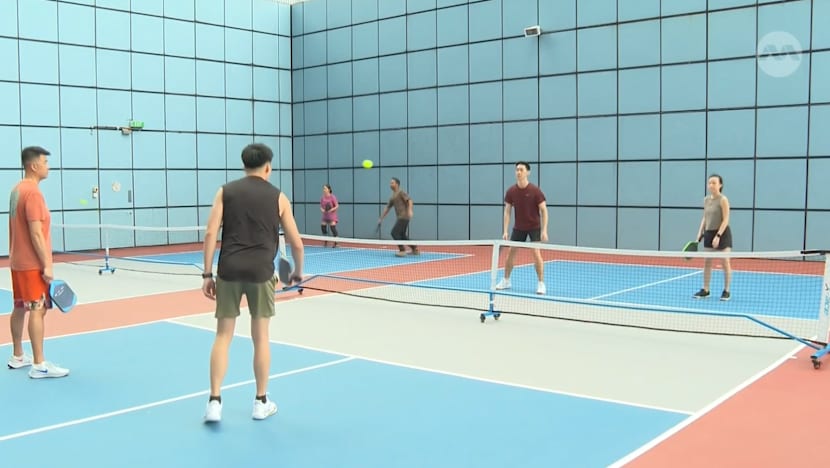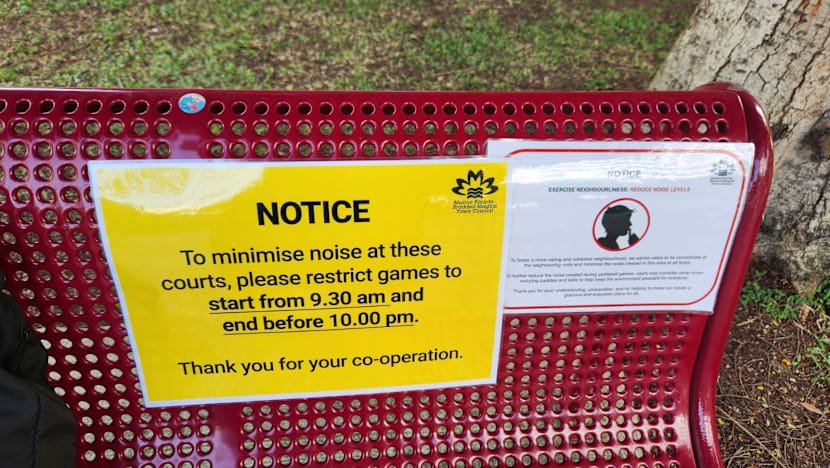Singapore’s pickleball boom brings growing pains
Players are struggling to book courts, jostling with other sports for space, and coming up against noise complaints.

Noise complaints about pickleball have led to more restrictions on playing the sport. (Illustration: CNA/Clara Ho)

This audio is generated by an AI tool.
SINGAPORE: When Singaporean pickleball coach Wil Heng first came across the sport in 2022, it was as if he had found a way to be transported back to his childhood.
The 41-year-old likened it to a kampung activity, with friends meeting up to sweat, exercise and have fun. He started playing as often as five times a week.
But these days, the frequency of his games has dropped.
“If there is one court to play, the ratio will be maybe 50 people fighting for (it),” said Mr Heng, who now tries to play during off-peak hours instead.
There is no publicly available information on the current number of active players of pickleball, which combines aspects of badminton, tennis and table tennis.
But when pickleball court bookings were first piloted at ActiveSG sport halls in 2014, there were fewer than 20 bookings each month, a spokesperson from the Sport Singapore (SportSG) governing body said.
In comparison, there were close to 8,000 per month across ActiveSG facilities in the first half of 2025.
The People’s Association has also reported a 40 per cent increase in pickleball participation at an annual championship this year, from the previous year.
And data from the Singapore Pickleball Association (SPA) showed that participants in the annual Pesta Sukan competition jumped nearly fivefold from 424 in 2022 to 2,106 this year.
SPA president Lim Ee Kiong told CNA that although pickleball's barrier to entry was "very low", he always imagined the sport's growth "would probably be a little bit more manageable, and not so exponential”.
According to SportSG, there are now approximately 70 courts across various ActiveSG sports centres and dual-use scheme facilities, which can be used for pickleball. Dual-use scheme facilities are in schools and can only be booked on weekends.
But securing courts through the ActiveSG booking system is difficult, pickleball players told CNA.
When CNA attempted to book a court via ActiveSG on a weekday morning, there were sixteen courts unavailable or up for balloting. Six were available but the slots on offer were for non-peak hours, typically between 12pm and 2pm.
Mr Heng, the coach, likened the balloting process to “fighting for Taylor Swift concert tickets”.
“So far, I have balloted six times. I got one time, and for two hours. Two hours is not enough,” he said.

While badminton courts at community centres are available for booking, not all permit pickleball, and players often face varying rules.
Pickleball enthusiast Charlie Teo, who has played the sport for over 30 years, said he has had run-ins with staff who told him he could only play pickleball if he booked both the courts available at his community centre.
“Some managers are pro-pickleball; no problem. Some people are not; then you have a lot of problems,” he said, adding that such restrictions have only cropped up in recent years.
According to the People's Association website, the decision to allow the use of badminton courts for pickleball is at the discretion of community centres. Currently, nine of them permit this.
Of these, one centre requires players to book an entire hall to play pickleball.
In response to queries from CNA, the People's Association said such arrangements are determined through “local assessments that consider available facilities and community needs at each location”.
Private courts are another, albeit more expensive, option.
Renting a court at the Play! Pickle academy costs between S$20 (US$16) and S$35 per hour. At Performance Pickleball, it ranges from S$32 to S$40 per hour.
ActiveSG charges Singapore citizens and permanent residents between S$3.50 and S$7.40 per hour to play pickleball at indoor courts. Badminton courts at community centres can cost from S$4 to S$16 per hour.
COMPETITION AND NOISE
With limited indoor courts, players have to venture outside to public, multi-purpose courts.
But with that has come inevitable, age-old issues of use and space.
Mr Wayne Kwan, 38, the convener of a pickleball interest group, said members sometimes clash with players of other sports, such as badminton and sepak takraw.
“It's always on a first-come, first-served basis. So for that kind of situation, you cannot really say that you have a confirmed location at a confirmed time and date,” he said.
Another challenge is related to noise – worsened by the fact that most public courts are in proximity to residential estates.
Member of Parliament for Mountbatten Gho Sze Kee said in a Facebook post in early August that there was feedback from residents about “persistent” noise from hard courts at a block in her constituency.
Earlier this month, CNA reported that at least four town councils were putting restrictions on pickleball games, including limiting access to courts and fixing playing hours.

Some enthusiasts said they were aware of the “tak” sound generated by the perforated plastic ball hitting the paddle, and the effect on their surroundings.
Others raised concerns about the restrictions on the growing sport.
“Some choose to ban totally. Some choose to stop at a certain time, but just because of a knee-jerk reaction (to residents’ complaints),” said Mr Alan Chang, 60, who started playing pickleball in 2019.
Ms Vanisha Chandiramani, 56, pointed out that some public courts would be unused if not for pickleball players.
“They were sitting like white elephants gathering a lot of dust,” said the lawyer, who picked up the sport two years ago.
Mr Roger Ho, who founded the Top Pro Pickleball Community, said the sport was an avenue for seniors to exercise and socialise.
Since starting out in 2022, the interest group has expanded from just a few members to over 1,500 – 90 per cent of whom are seniors.
“They are free … but where do they go to play? The question is, aren't we promoting senior citizens to exercise? Pickleball is the right game,” Mr Ho, 63, said.
There has been talk about using softer balls – although pickleball player Mr Lau said doing so may “lose the essence of the game”.
“Some of the things that pickleballers could do is to really manage the sounds that they make from cheering, or from the excitement,” said the 50-year-old, who declined to share his full name.
In response to CNA's report on town councils setting restrictions, Ms Gho wrote in a Facebook post on Wednesday (Sep 3) that "such frictions" are to be expected in a dense urban community.
She added that authorities will continue to "listen and engage".
"There is reasonably no way we can please everybody. But a little more give-and-take by everyone goes a long long way," she wrote.
POSSIBLE SOLUTIONS
The pickleball association president, Mr Lim, has over the years tried to lobby for more court space, reaching out to stakeholders ranging from town councils to condominium management.
He said he recognises that other sports also need the use of public courts, and is thus advocating for more multi-purpose ones rather than just building new dedicated pickleball courts.
Mr Lim suggested that multi-purpose courts be built within public parks, similar to what has been done in cities such as Bangkok, Taipei and Jeju.
This would contain the noise instead of having it reverberate off housing blocks.
Pickleball enthusiasts CNA spoke to also proposed various ideas to increase the number of facilities, including by repurposing underutilised spaces such as warehouses, carparks and old tennis courts.
They also suggested adding more shelters to public courts, for the sport to be played regardless of time and weather. Having more sheltered courts would also encourage people to play later in the day, instead of early mornings, they said.
Among other things, SportSG is working with more schools to open up their multi-purpose halls under the dual-use scheme.
The agency is also working with town councils and the People’s Association to identify more locations that can be used for sports facilities.
In an announcement in mid-August, the Singapore Land Authority (SLA) said a state property at 179 Piccadilly in Seletar has been earmarked for such use, with the provision of at least eight pickleball courts.
In Chua Chu Kang, a new pickleball court will be built near an existing sports facility, in the first quarter of next year.
SPA’s Mr Lim said such solutions were “kind of double-edged”.
“If you give more today, tomorrow it becomes insufficient … because you are feeding the growth,” he said.
“But does that mean that because of that, you don’t feed the growth? That would also be quite odd. So (things) must come to a certain kind of equilibrium.”


















